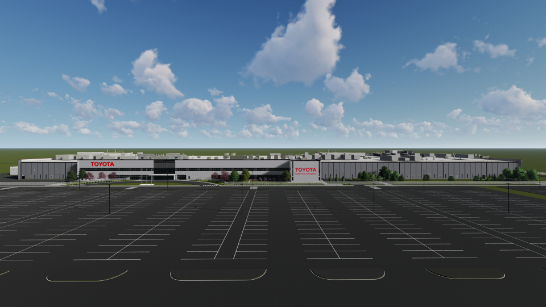- Home
- OFweek News
- Toyota's $14B Battery Gambit: North Carolina Plant Spearheads Next-Generation EV Technology
Toyota's $14B Battery Gambit: North Carolina Plant Spearheads Next-Generation EV Technology
Published: February 13, 2025 13:44
Toyota has announced that its battery manufacturing facility in North Carolina (TBMNC) has completed production preparations and will begin supplying batteries to North American electric vehicles starting April 2025, marking a significant milestone in the company's global electrification strategy.
The $14 Billion Investment

source: Toyota
As Toyota's first wholly-owned overseas battery facility, this plant represents over three years of strategic planning. Established in 2021 as Toyota's eleventh manufacturing entity in the United States, TBMNC received substantial capital injections totaling $10.1 billion throughout 2023 - comprising investments of $2.1 billion and $8 billion respectively. The total investment now stands at approximately $14 billion, with projections to create 5,000 new jobs in the region.
The state-of-the-art facility features 14 highly automated assembly lines, with ten dedicated to producing battery modules for electric vehicles (EVs) and plug-in hybrid electric vehicles (PHEVs), while four lines are allocated for hybrid electric vehicle (HEV) battery production. Production capacity will be scaled up progressively, targeting full operational capacity exceeding 30GWh annually by 2030.
Advanced Battery Technology Pipeline

source: Toyota
Toyota's battery technology roadmap, unveiled at GAC Toyota's inaugural Technology Open Day 2024, showcases four next-generation battery innovations:
Performance Lithium Battery (2026):
• Range: 1,000+ kilometers
• Charging: 10-80% in under 20 minutes
Mass-Market LFP Battery (2026-2027):
• Range: 600 kilometers
• Charging: 10-80% in under 30 minutes
High-Performance Lithium Battery (2027-2028):
• Range: 1,000+ kilometers
• Charging: 10-80% in under 20 minutes
Solid-State Battery (2027-2028):
• Range: 1,000+ kilometers
• Charging: 10-80% in under 10 minutes
The solid-state battery technology has garnered particular attention from industry analysts. In September 2023, Toyota secured approval from Japan's Ministry of Economy, Trade and Industry (METI) under its "Battery Supply Security Plan" for both next-generation performance batteries and solid-state batteries, with a combined annual production capacity of 9GWh. Production of the next-generation performance batteries is scheduled to commence in 2026, coinciding with the launch of Toyota's next-generation battery electric vehicles (BEVs).

source: Toyota
